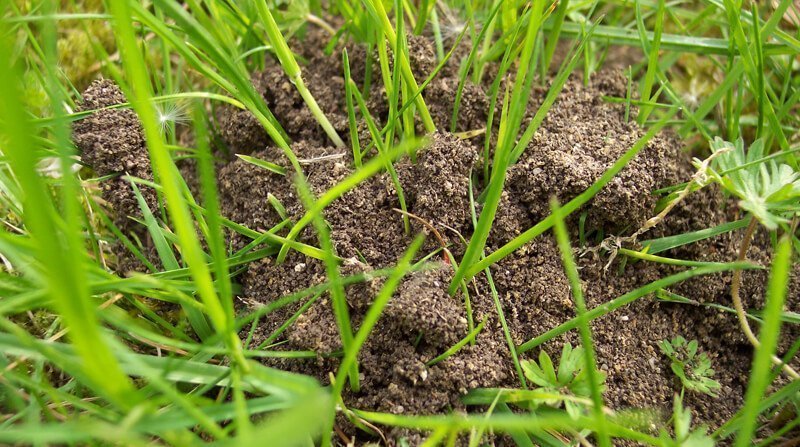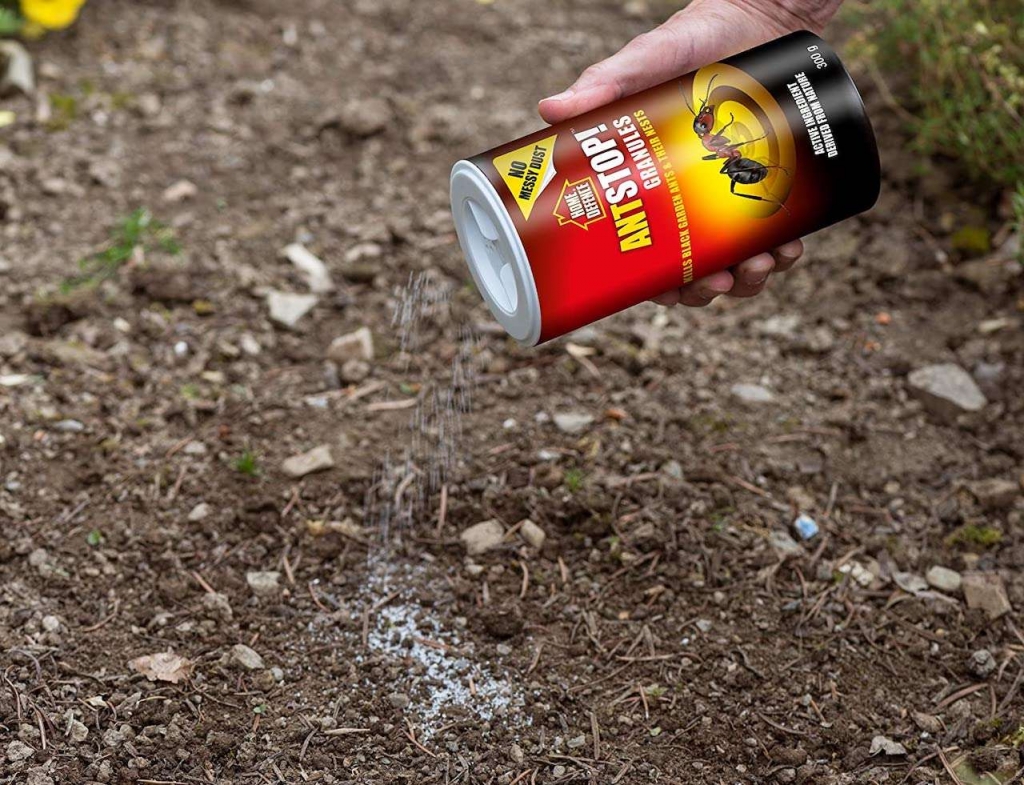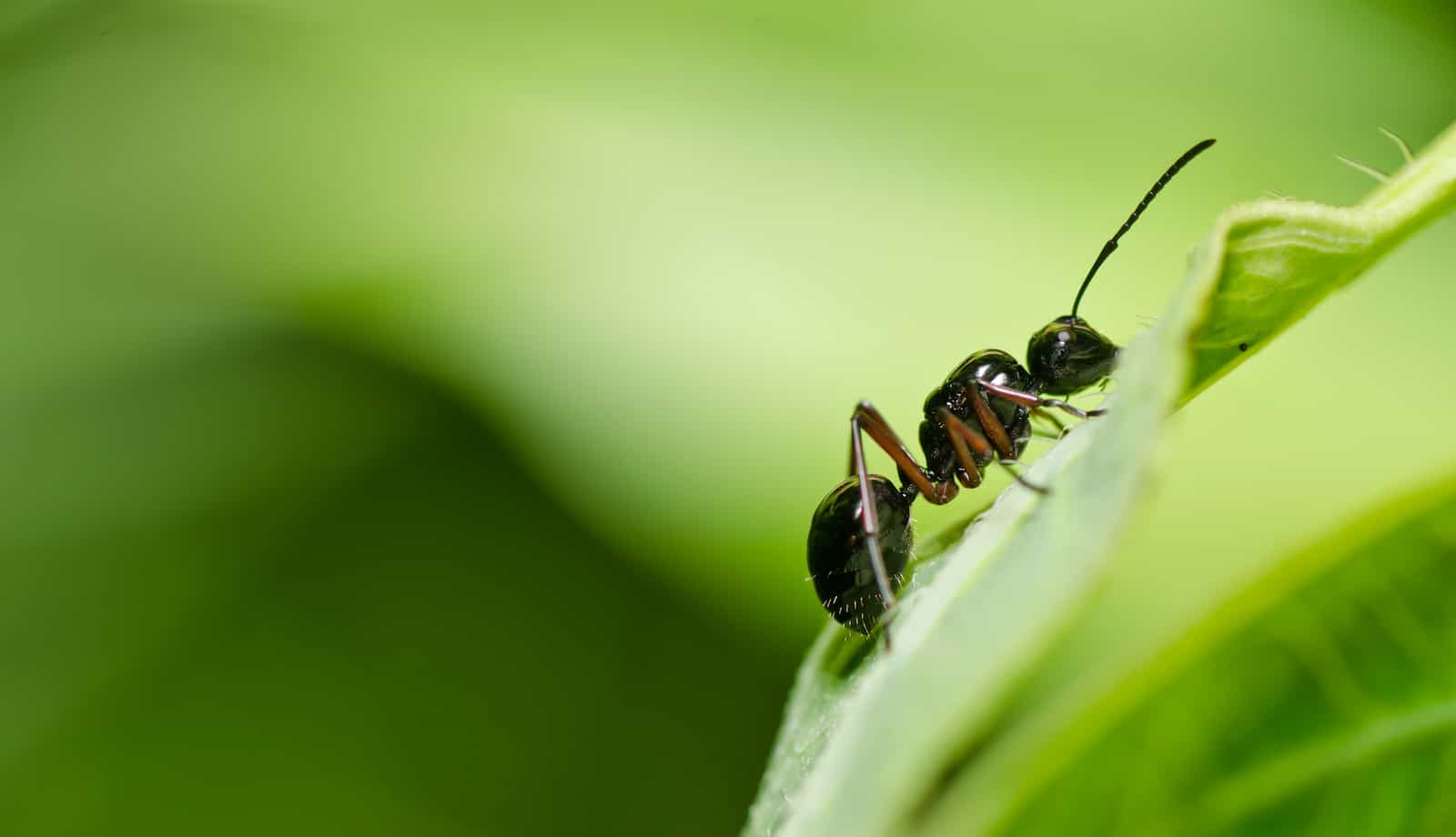Ants in your lawn can be a nuisance.
They can cause significant cosmetic damage to your lawn as they create mounds of excavated soil on the surface of your lawn (known as ant hills).
But ants can create other problems too, not only in your lawn but in other areas of your garden.
So in this article, I’m going to explain everything you need to know about ants.
How Ants Live and the Affect They Have on Your Garden
Ants are social insects that form large, organised colonies. They build complex nests that often contain thousands of individuals.
Ant nests contain one or sometimes several fertile females called Queen Ants. They lay eggs in specific areas of the nest called Brood Chambers.
Most of the other ants in the colony are smaller females called Worker Ants whose job it is to protect, maintain and grow the nest.
There are other ants called Soldiers and Drones whose job it is to find and bring back food.
Ant nests are very complex structures. They contain nursery rooms where larvae are fed and looked after, food storages rooms and farming rooms. They even create tunnels just to help with airflow.
How Ants Affect Your Lawn
Many ants build their nests in or under lawns. They prefer well-drained soil in lawns that don’t suffer from compaction. This means even the best cared for lawns can fall victim to ant infestations.
They’re not all bad though. They hunt other insects in your lawn and their nests can help with lawn aeration.

However, as they excavate the soil they leave it on the surface of your lawn. These ant hills can affect your lawn in a few ways;
- They can make your lawn uneven
- Make mowing the grass difficult as the lawn mower blades get stuck on lumps of soil
- Kill the grass under the mounds of earth, especially if the grass is short
They also eat through the root zone of the grass as they build their colonies. This can result in patches of dead grass appearing.
They Also Indirectly Affect Your Garden as a Whole
Ants like to feed off Honeydew which is secreted by Aphids (sap-sucking insects) as they feed on plant sap.
To keep a constant supply of Honeydew, ants protect aphids from predators like Ladybirds and tend to their ongoing needs. This protection often causes an increase in aphid activity all over your garden. This, in turn, leads to plants being damaged as they’re used as a source of food.
Home Made Ant Killers Vs. Professional Products
If you want to completely get rid of the ants in your lawn you need to target the source. In other words, the nest.
There are a few ways to kill ants nests which include home remedies and specific ant killers. Home remedies have their drawbacks and I’d recommend you use a proper ant killer but in the interest of being thorough, I’ll cover both.
Home Made Ant Killers
When it comes to killing off a nest, there are numerous home remedies that get recommended on the web. The problem is, they often don’t work immediately, don’t work at all, or have other side effects.
These include;
Pour Boiling Water into an Ants Nest
This is the most widely known way to kill a nest. Simply find as many entrances as you can and pour boiling water into them.
The issue is that this;
- Often takes several attempts
- This can result in wet, boggy areas in your lawn, and
- It can scald your grass causing it to turn brown
Use Dishwasher Liquid and Olive Oil
Another common method is to mix washing up liquid with olive oil and water. This penetrates the ants’ exoskeleton and suffocates it.
Again though, it can take a while to work and the detergent can bleach the grass, making it paler than the rest of the lawn.
Put Boric Acid and Sugar on Your Lawn
The idea behind using Boric Acid and sugar is that you mix it into a paste and put it on certain areas o of your lawn near the nest. The sweet sugar attracts the ants and they take it back to the nest for the colony to feed on. Then the Boric Acid kills the ants.
The problem with this approach is that it needs to be mixed very precisely. If you don’t use enough Boric Acid, you won’t kill the ants. Use too much and you’ll kill the ant that takes it before it’s reached the nest. You’ll also kill the grass.
Pour White Vinegar Onto a Nest
Many people recommend pouring a litre of white vinegar onto an ants nest.
It kills ants on contact but the chances of it penetrating and killing the whole nest are slim. You’ll only kill the ants on the surface and may the ones just under.
Use Diatomaceous Earth
Diatomaceous Earth has been proven to be effective against a variety of bugs. The idea is that you sprinkle this powder on your lawn and it’ll cause decreased mobility in the ants and eventually they’ll die of dehydration.
There are a few flaws with this though;
- The word ‘eventually’ means it’s not the quickest remedy
- It’ll only kill the ants that come into contact with it, not the whole nest
- A rain shower will wash the powder away – so you have to wait for a dry period.
Another solution I recommend you use is a professional ant killer.
Professional Ant Killing Products

For the most reliable, quickest results, choose a product that is specifically designed for killing ants.
I have also found there is no one solution to killing ants. It is always best to use a multi pronged approach to give you the best chance of removing them.
I recommend Home Defence products to homeowners as they are usually enough to get the job done.
I use their products in a 3 stage solution:
- Stage 1 – Fast acting killer spray: quickly kills ants you have in around the house.
- Stage 2- Ant killer granules: apply on ants and on to the ant nest to kill the colony.
- Stage 3- Ant bait stations: can be left around the garden/house for any remaining ants to feed on and take back to the nest.
Fast Acting Ant Killer Spray
This is usually used on the first stage when you first find the ants and just want to remove them from the area.
While this is not designed to be used on your lawn directly, the ant killer spray is highly effective at killing ants quickly in and around the house.
I would not recommend wasting your time spraying ants around your whole garden, as there are other solutions for that.
Just use this in the areas in and around your home.
Ant Killer Granules
After you killed ants in and around the home, it’s time to go after the colony.
The ant killer granules can be used to kill ants in two ways:
- On contact: Diluted in water and poured over the ants and ants nest.
- Ingestion: You sprinkle the granules on and around the nest for them to feed on and take back to the nest.
If you know where the nest is, it would be wise to use both methods above.
Please note: this is not a fast acting solution. It is designed so the ants take the ‘food’ back to the nest so the colony can be destroyed.
Depending on the size of the nest, you may need a second application a month later.
Ant Bait Stations
The final stage is about killing ants and nests you have missed – which you probably will.
The ant bait stations are designed to be laid near and the around the nest so the ants will feed on the liquid inside and take it back to their nest. The active ingredient spreads through the nest and kills the whole colony at the same time.
I personally buy 6-8 of these (depending on the garden size) and have the bait stations in and around my lawn (as well as several more all around the garden) to kill off any ants before the colony can get established again. Then, if on the rare occasion a colony establishes itself, I’ll go back to stage two and apply the granules again.
A note for those with pets: The stations do contain poison, however, it is contained within the box making it somewhat safe. My experience is that pets ignore the stations as there is nothing of interest to them – just keep an eye on them when you first put them down.
How to Kill Ants, Remove Ant Hills From the Lawn & Prevent them Returning
This is the step-by-step process I use to kills the ants in my lawn, remove the ant hills and prevent them from returning.
Step 1: Kill the Ants With Kill Granules
The first step is to kill the ants.
Get some ant killer granules and mix with water as recommended (or less water for a more powerful solution).
Wait for a dry spell and apply it directly on the ant hill and surrounding ants with either a watering can or knapsack sprayer. If the weather stays dry it should kill the ants within a few days.
Step 2: Remove the Ant Hills
As we know the ant hills are nothing more than excavated soil that has been left on the surface of your lawn.
If it’s dry you can disperse them with a brush which is easy to do as the soil is so fine. I personally hoover the soil up with a beat-up old vacuum. I’ll admit, people do look at me strangely when they see me hoovering the lawn but it works a treat!
Wet soil is harder to shift, you can’t spread it because it smears and could trap the grass under it. Scooping it up with a spade could also ruin the grass. I prefer to get stuck in and pick it up with my hands.
Related read: Top Rated Garden Vacuums in the UK
Step 3: Prevent the Ants Re-Establishing their Nests With Bait Stations
It’s pretty much impossible to completely remove ants from your garden so it’s not worth trying.
But you can prevent them from colonising with the use of bait stations. They attract feeding ants who take this poisonous food back to their nests, killing the nest while it’s small enough to not be a problem.
Leave these bait stations in the areas where you had nests.
It’s also worth buying a few of them to put around your whole garden so they don’t go and colonise another area.
In Conclusion
Despite having shown you how to kill ants, they can be a pain and unfortunately, you’ll never completely rid your garden of them.
That said, with the right approach, controlling their numbers is very doable and you’ll see a big reduction in their numbers.
But be prepared for an ongoing battle!
If you’ve got ants in your lawn let me know in the comments. Have you got any secret hacks to get rid of them? Let me know.
And as ever, if you have any questions, leave a comment and I’ll do my best to answer them.


Hi Tim
Our lawn was ruined by ants. Just had a new one laid. Told to keep it wet initially and rain expected as wel so when would be best time to spray with Nippon. We also have ants coming on to paths from side flowee and shrub borders. Is it ok to use Nippon spray there too?
Many thanks, Chris
Where do I purchase the sachets and how much do the sachets cost? Fran
Very useful article, thank you. The garden at our new house has not been maintained for years and we have at least 3 ant hills which range from 20-30cm high and lots of smaller humps in the lawn…. and at 220ft of garden we have a battle on our hands…. off to buy shares in Nippon 🥴 if you have any further advice for such a large garden and size of ant hills, we would appreciate it. Many thanks, Sue.
Hi Sue, I’m in the same position as yourself. Have you had any success in using this Nippon method over the lawn?
hi i have thousands of ants in my grass and patio but i cant find the nest. There is nothing raised like it states on the net just lots of ants. if you stand still they cover your shoes etc and we can not sit on the patio furniture without them being there. I have used white powder that i shake and put around the patio, but this only keeps them at bay and doesn’t get rid of them. Help please as its horrendous
My lawn is covered with ant hill and wish to use thus product but I have a dog. Is is safe for pets. I am desperate as dog and my daughter allergic to insect bites.
I’d love to know this too. I have 20 ant nests and I get rid and then they come back in other area. I have two cats and two dogs and need to ensure what I use is pet safe
which product is best for lawns as we have dogs . They sometmes eat grass.
Hi my whole yard is covered with ant hills and I’m wondering if you could guide me please. How can I tell which ant hills are the queen ant under can you help. I’m desperate to have my beautifull lawn back again
Hi. Last year I took on the ants in my lawn with various home remedies and a couple of bait stations. It clearly failed as this year there are ant hills literally every step and my lawn is basically ruined. A large proportion of them are red ants. I can’t afford to have a new lawn laid so I have to fix what I’ve got. I’ve veered away from chemicals (apart from the bait stations) because I have 3 cats. Is the lawn safe for the cats if I use your spray method? Also, will the spray affect other insects, like worms & ladybirds, and will it affect the birds? I may have 3 cats but they don’t have free reign in the garden partly because we live in a rural area with a very wide variety of birds, a lot of whom spend ages on our lawn eating the worms and ants (just not enough to get rid of them!).
Hi,
I have thousands on ant hills in my lawn and coming up in cracks in driveway. Help!!!!!!!
Should I use a professional or can I do it myself. I have used many insect killers and none of them seem to Help
Warren
Hello.
Nippon only works with black ants as they eat sugar.
Red ants eat protein so do not go into Nippon bait stations etc.
We have had many red ants nests and found best way to keep at bay is to use plenty of buckets of water per nest with washing up liquid to dry out exoskeleton/skin and peppermint oil. They come back every year but as a massively reduced amount of nests. A few more seasons it may be none!
Where can you buy this in United States? Everything I found comes from overseas?
How do I get rid of many hard ant hills they have hade my lawn lumpy all over
Looking for an inexpensive way to get rid of these ants I have photos but can’t up load them I live in morayfield and have been told the are tunnel/funnel ants but i don’t know as i’m no expert it makes mowing the lawn nearly impossible